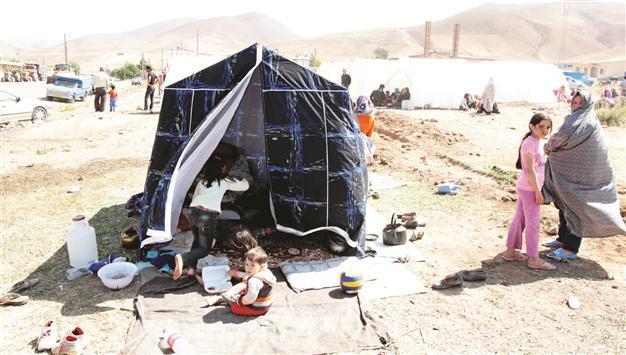Iran faces criticism over relief efforts after quakes
TEHRAN

Iranian locals of Amir-Ali Kandi village who lost their house in an earthquake stand next to tents in the city of Varzaqan north western province of Iran. EPA Photo
Iran’s government faced criticism from lawmakers and the public yesterday over its handling of relief efforts after two large earthquakes killed 300 people and injured thousands in the country’s northwest.
Members of Parliament representing the affected areas complained about the shortage of tents for survivors, parliamentary news agency ICANA said, and Iran’s top lawmaker Ali Larijani stepped into the debate. “The crisis management headquarters must take broader steps to alleviate these concerns,” Larijani, a rival to President Mahmoud Ahmadinejad and possible candidate in the 2013 presidential elections, was quoted as saying by the agency.
Lack of tents for survivorsIran yesterday raised the death toll from Aug. 12’s twin earthquakes to 306, a day after rescuers called off the search for survivors, state media reported. Although officials announced that search and rescue operations had finished, some residents expressed disbelief that authorities could have reached some of the most remote villages so soon.
“I know the area well. There are some regions where there are villages that you can’t even reach by car,” one doctor in the city of Tabriz told Reuters by telephone. “It’s not possible for them to have finished so soon.”
The moderate conservative newspaper Asr-e Iran reported that a full 24 hours after the earthquake, some villages had not yet been visited by relief teams. “[Residents] say that most of the villages have been destroyed and still no tents have been sent, nor has any help been sent for the victims,” the report said.
Two large quakes with magnitudes of 6.4 and 6.3 struck East Azerbaijan province on Aug. 11 afternoon, flattening villages and injuring thousands around the towns of Ahar, Varzaghan, and Harees, near the provincial capital of Tabriz. Officials said the emergency response to the disaster was rapid, even though relief teams were hampered by the remoteness of quake-hit villages.
Tabriz residents and legislators also criticized state-run television’s early coverage of the disaster, saying it did not reflect the extent of the damage in the first hours. The lack of coverage, some said, contributed to a sense that the central government in Tehran did not care much about the people of northwest Iran, most of whom are Azeri Turks, the biggest ethnic minority in the country.
